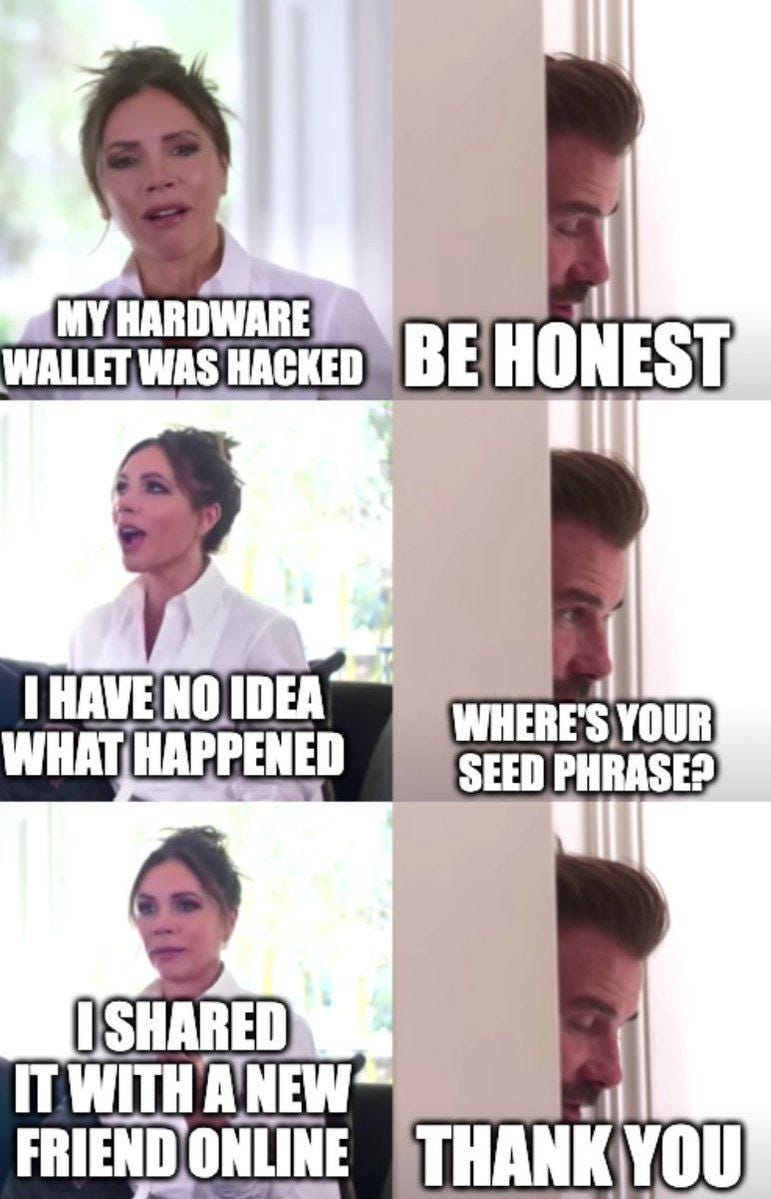Bitcoin Tech Talk #408
Interesting Stuff
The Real Purpose of College - The cost of college is astronomical, the education is very politically biased and the resulting degrees valued less and less and yet, families the world over still clamor to get into Ivy League colleges. Why? This article posits that the real reason is the marriage market that opens up to the students that graduate. Indeed, marriage is consistently something that parents are willing to pay for and it makes you wonder, are college tuitions the new dowry?
Aristocracy and the number of children - Speaking of marriage, this article examines something I never really thought of, which is the view of having lots of children among the aristocracy in the past. I had always thought more=better, but in fact, having lots of children was reason for a lot of strife over family resources, and thus, not desirable. This shows up in something you wouldn't expect, Shakespeare's plays. The dramas generally have more children that are competing, while comedies have fewer children. In a sense, this makes sense as aristocracies in the past were essentially zero-sum and in a sense, Fiat money has put most people in the same zero-sum state.
Explaining Job Satisfaction - The author's starting topic is Universal Basic Income (UBI) and the attitude shift in the left from the labor theory of value to how most jobs are stupid and unnecessary and thus UBI would free them from this drudgery. The most interesting part of the article is the suggestion that perhaps a lot of the increase in job satisfaction is that everyone has a cell phone, and can goof off (video, social media, etc) for significant amounts of time. Indeed, seen in one light, rent-seeking is more bearable than ever as there are lots of distractions from the existential dread.
Are we the baddies? - Speaking of social media, this article inverts the normal concerns around privacy where instead of Big Brother watching us, it's we who are Big Brother. The suggestion is as intriguing as it is alarming, because in a sense, it is we, as watchers (or followers, commenters, audience), who affect the behavior of others online. As the author suggests, this gives us a certain power over people and it's that which we are in some ways addicted to. The outrage online, for example, is an expression of that desire to control others. I honestly wonder if social media and this dynamic is ultimately what caused the conformist behaviors during COVID.
What I'm up to
After an exhausting week in Nashville and entering the end of summer doldrums, I don't have too many things going on, so instead of links to new talks or events I'm planning to go to, I'm going to add a few more links I found interesting this week.
Cancelling and Bullying - The main topic of discussion is the cancelling of people on the left for their reactions to the Trump assassination attempt. There's a variety of reactions, from “we're better than that" to “they need to be punished so they learn.” This article suggests that this is setting up for a cycles of violence which end with spectacular destruction and that instead of a tit-for-tat revenge mentality, that there needs to be something positive, something almost spiritual to stop the vengeance cycle that's coming. If you've read Girard, you can see where this is going.
Elite Gullibility - Scott Locklin has an excellent rip on just why we haven't made much scientific progress since 1970. Of course, we all know a big part of the reason is fiat money, but one of the results of fiat money seems to be a deep gullibility among the elite. That is, they're willing to believe pretty much anything if they're told to. The lack of skepticism, Locklin suggests, is the reason why progress has gone so awry. The money printer demands unwavering support, after all.
Technocratic Fantasy - The current state of academia in general and science in particular is unsatisfactory to pretty much everybody, including those that are currently in it. Science has lost a lot of credibility, much of the respect and admiration they once had is gone and there are scandals everywhere. What's fascinating is how most of the people in academia want some sort of technocracy, where experts rule. Despite the fact that such schemes were exactly the ones that failed spectacularly in communist countries, they believe that some panel of experts should control everything. As usual, most intellectuals trust credentials too much and assume virtues which are demonstrably not common among their class. Such is fiat delusion when incentives are misaligned.
Nostr Note of the Week
Here's the source for the tweet (an interesting article in its own right).
What I’m Promoting
Unchained Capital is a sponsor of this newsletter. I am an advisor and proud to be a part of a company that’s enhancing security for Bitcoin holders. If you need multisig, collaborative custody or bitcoin native financial services, learn more here.
Bitcoin
Cold Water on HWW - Hardware wallets have been the standard way to store Bitcoin for a long time. Ever since the Trezor was introduced back in 2014-15, hardware was considered the most secure. But as this article points out, is it really as beneficial as they say? The big concern that I resonated with was the one about constant software and firmware updates. If these things aren't good for more than a few years, is it really worthwhile? Given that Bitcoin is a store of value for most people, I think we'll see a trend toward more guarantees about how long the software and firmware will be supported.
Cost of Compact Blocks - Compact blocks have been around a while, where nodes reconstruct blocks based on transactions that they already have in the mempool and supplementing those with requests for specific transactions that they don't have in the mempool. The essential tradeoff is reducing bandwidth for more CPU work for the node. 0xB10C has quantified this tradeoff by gathering some data around it. The most interesting part for me was the effect of fullrbfbydefault which would be expected as mempool policy affects whether all the transactions of a block are in the node's mempool.
More Core Security Advisories - Two more disclosed security advisories this week, both fairly major that were corrected back with version 22 of the software. The first is remote crashing using addr messages and the second involving UPnP which could also crash your node. There are also going to be more patches and security advisories released in the next few weeks as per the op tech newsletter.
Lightning
sats2data - This is a service that lets you buy data plans for your phone using Lightning. For people traveling, this kind of service totally changes the game as there's no longer a need for physical sim cards with the advent of e-sim. There are so many subtle inconveniences with respect to payment when it comes to travel, from your credit card being declined, to cash-only places and having to buy various public transportation tickets. Travel is an enormous industry that I expect Lightning to expand in.
Not Available in NY - I don't live in this over-regulated state and take pains to avoid it if possible, so I wasn't aware of what's probably obvious to anyone that's in NY, that Lightning is not enabled by a lot of popular services. The reason seems to be regulation related to the almost 10-year old BitLicense. Despite having one of these licenses, Coinbase still doesn't provide Lightning withdrawals in NY, which is likely because of some regulatory gatekeeping.
BOLT12 Contact List - BOLT12 allows for payment without any interaction (say, with a QR code). What's missing, however, is the ability to confirm that a particular payment came from one of your contacts. This is currently impossible because BOLT12 has as part of its standard privacy built in for the payer. The forum post here goes through what it would take to add mutual authentication to BOLT12 to make the payment experience a bit more like Venmo.
Economics, Engineering, Etc.
hodlboard - This is forum software, with one interesting feature. In order to sign up, you have to show that you have control of 500k seats in a UTXO. What's more, the proof is zero-knowledge, meaning the forum doesn't know which 500k+ UTXO you signed with, just that it exists. I would love for something like this to become a standard for centralized accounts, as KYC data has a tendency to leak and this is not easily Sybil-able.
Bitcoin Based Lending - Unchained has been doing this a long time, and others that did this while rehypothecating the Bitcoin are long dead. What's notable about this particular lender is that it's a bank that's got an account at the Federal Reserve. That is, they can create loans ex-nihilo, so the rates should be significantly lower than what Unchained charges. There's probably going to be significant use of this system to create leverage one way or the other.
Russia and Crypto - Apparently, Russia is now allowing for international settlements in “crypto” payments. This is not a surprise given the sanctions that the country is under and the balance of payments that it has to settle. I expect this usage to only grow as Bitcoin is neutral as opposed to pretty much everything else, including every altcoin.
Quick Hits
FATF Report - Says terrorists are using virtual assets more. Seems like a move to prep some sort of regulation.
LN TX #s - At least on a per person basis, the recent BM conference wasn't great at enabling merchants to use Lightning.
Kyiv BTC Murder - A man was abducted and killed for the 3 BTC he had in his possession.
CIA Made? - So claims Tucker Carlson about Bitcoin.
Fiat delenda est.








